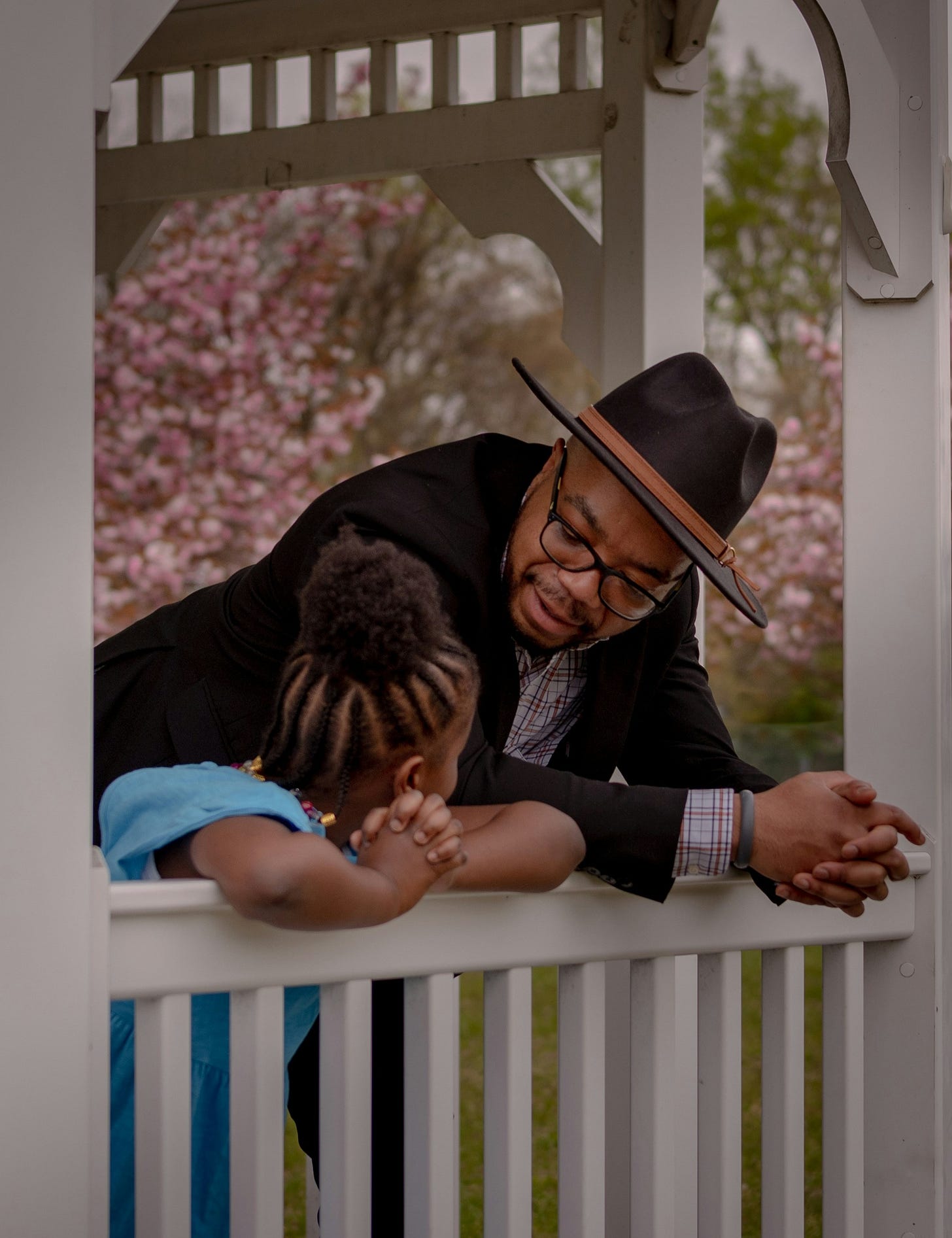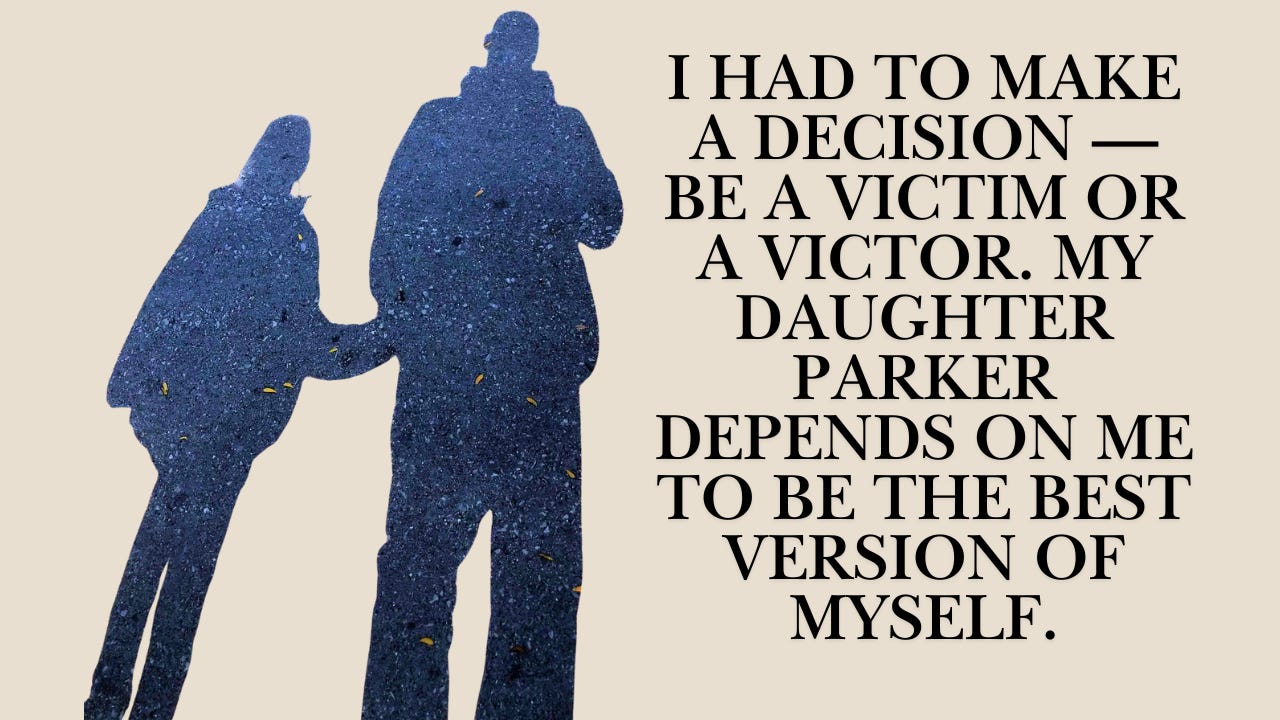This is bigger than money
A single dad’s journey through divorce, debt and discipline.

Editor’s note: This piece was originally published as part of the “Inside the Mind” series at Money Tips Money Hacks on Substack.
I connected with Cervante, the creator of the publication, virtually during the winter and have genuinely enjoyed watching his rapid growth and the impact he’s making. His platform is full of honest, practical financial insights for everyday individuals.
In this conversation, we dive into my journey as a single father navigating divorce, debt and financial discipline, along with the lessons I’m teaching my daughter, Parker, about wealth-building and long-term financial health.
Subscribe to Money Tips Money Hacks for more valuable content on money, mindset and more.
1. How has being a single father influenced your approach to financial planning and budgeting?
I often go back to Chris Rock’s hilarious but profound stand-up joke about his divorce proceedings, when he looked around the courtroom and saw an ecosystem of hustlers. He spotted a combined six lawyers for both parties, the judge, a bailiff and a stenographer. He called it “a whole town.”
“And I’m looking at all these people, and I realize that…everybody in there is there to take my money,” he said. “Everybody in here is going to leave with more money except me. And they got up that morning. They brushed their teeth. They put on suits. They fixed their hair with the sole purpose of taking my shit. And, at that moment, I realized something. I made it.”
My experience wasn’t much different from what Rock described. And from that moment, I had to make a decision — be a victim or a victor. My daughter Parker depends on me to be the best version of myself. And so rather than pout about my circumstances post-divorce, I grew stronger and more determined. I made a plan and began working on it every day.
I realized through my divorce that if I could afford to pay numerous attorneys, several guardians ad litem, spousal maintenance (alimony) and annual court costs, then I had more money than I assumed. It was simply a matter of managing it better.
It took me about seven years to climb out of the hole divorce put me in financially. But that ordeal was the driving force behind me becoming smarter with my money. In August 2022, I became as intentional as I’ve ever been. I began budgeting, tracking, scaling back and investing for myself and my daughter.
When it became clear to me that no one would instill these lessons into Parker if I don’t, I grew obsessed. I’m her roadmap, her blueprint. Parker will model what she sees in her parents, and so I must show her a good example.
2. What financial lessons do you aim to teach your daughter to help her build a solid foundation for the future?
My overarching lesson to Parker is a simple, three-step formula: make money, keep money and build money.
Using those basic buckets, she’ll understand the importance of generating income and preserving and growing her wealth.
We also spend a lot of time on understanding the difference between assets and liabilities, the value of investing, and principles like compounding and delayed gratification.
But above all, I want Parker to maintain a long-term vision that extends well beyond her life. I want her to understand that we’re laying the foundation for our future generations. What we’re doing is bigger than even her. When she adopts that understanding, life will become easy. Her priorities will be rooted in righteousness, and all that she so much as thinks about doing can be held against that standard.
3. How do you balance financial obligations like child support, personal expenses, and saving for the future?
The first thing I had to do was clean up my mess. It’s almost impossible to manage so many financial obligations without proper structure.
For me, that meant cutting back on alcohol, dining out, dating and spontaneous spending. Those temporary pleasures were not necessary. In fact, they were only adding to my bills and blowing up my credit card balance with costly interest fees.
After changing my habits, I shifted my mindset. Investing in myself became my top priority. I adopted principles like “paying myself first,” recognizing that no one else would prioritize my financial well-being. This shift in management and mindset has been crucial.
4. What financial challenges did you face during or after the divorce, and how did you overcome them?
Debt was my biggest hurdle. I owed more than I had and struggled to find ways to increase my income. I was fortunate to receive assistance from my mother, who provided interest-free loans to help with attorney bills. It wasn’t easy, but I paid her back over time, which helped me regain control of my finances. It took seven years to recover, but I learned invaluable lessons along the way.

5. How do you approach discussing finances with a new partner while managing your responsibilities as a single parent?
I’m fortunate to be in a loving relationship with my lady friend Triest so I don’t have to navigate difficult conversations with new partners. She’s also a single parent, which has made it easy for us both to understand that our children come first.
Triest has also been by my side at every step of my evolution, and while I’m sure my growth has been inspiring for her to witness, it isn’t always the easiest. I’m frugal and forward-thinking. Fun looks a lot different for me now. Most people love making money. Few love focusing on money and talking about it as much as me.
We all have our differences, but connecting with someone who supports you is critical in choosing any partner. How they are with money just happens to be one of the easiest characteristics to spot.
6. What advice would you give to other single fathers about prioritizing financial health while navigating co-parenting relationships?
Start by taking care of yourself. It’s difficult to be in great financial health if we’re not in optimal mental, physical and emotional health.
Wake up early. Eat healthy meals. Go to the gym. Take walks. Read. Meditate. Journal. Limit screen time. Start a new hobby. Donate your time, talent and treasure to charity.
These are all things that have worked for me. Most have nothing to do with money. Yet it’s amazing how my money has multiplied in spite of my child support obligation or sky-high attorney fees. Fill your buckets first. The money will follow.
7. How do you handle the emotional impact of financial stress while being a present and supportive father?
In the past, I didn’t handle it well. Parker is 11 now, but she has vivid memories at 5 of being subjected to me sleeping Saturday mornings away. Every other Saturday was the same. She’d wake up around 8 a.m., play by herself and at some point grow the courage to come wake me up and inform me that she was hungry.
I’m not proud of those days, but I’m glad that Parker remembers them. She can cite first-hand the chaos emotional stress can cause. And even though she doesn’t always love our money talks, she admitted to me recently that she prefers this more disciplined version of me.
I’m much more present now.
8. What strategies have you found effective for maintaining financial stability while rebuilding your personal life?
I’m a big believer in tracking. I’m good at holding myself accountable by tallying the cost of my vices, such as alcohol and marijuana. I can’t understand the financial damage I’m inflicting if I don’t track my spending. For example, I learned through tracking that I spent $255 just on smoking papers in 2024. And now, I know to slow my roll.
Cutting back is another big one. There is so much we buy that we don’t need: cable, subscriptions, coffee, meals out, shopping, vacations, vices. Instead of paying for every creature comfort, compartmentalize what truly matters. Ask yourself if it’s a need or a want, if you like it or love it, have to have it now or can wait a little while.
Incorporating those strategies helped me to keep my spending in check by prioritizing what’s most important.
9. What steps are you taking to ensure financial security for yourself and your daughter in the long term?
Since 2022, we’ve shifted our focus to stock market investing. I invest $167 monthly into a total stock market index fund for Parker. It’s a custodial account that I can’t withdraw money from. When she’s 21, it’ll be all hers, along with the healthy habits she learned along the way — hopefully!
I also started Parker with a Roth IRA in 2024, which allows her investments from her earned income to grow tax-free. Through consistent investing and with time on her side, both vehicles are sure to make her a multimillionaire.
I max out my Roth IRA each year, contribute to my employer-sponsored 401(k) plan up to the employer match and dollar-cost average into a total stock market index fund. We keep it basic, trusting in the simple path to wealth.
This year, we’re jumping into real-estate investing as a way to grow and preserve our wealth. It’s new territory, but we’re ready to take on the challenge.
10. Looking back, what financial decisions during your marriage and divorce do you wish you had approached differently, and what lessons have you learned?
It’s funny, because I can’t shake this nagging memory from my marriage of my co-parent giving me hell for buying a $5 footlong from Subway. It was one of the most confusing, almost emasculating, arguments I can remember having as a married man.
Here I was, this hot-shot writer who made decent money and didn’t bother anybody. Yet my spouse was trying to tell me how to spend it. She was ahead of her time. I should have listened. All she wanted was for us to save money by eating at home.
Today, I apply that lesson and many others that I didn’t catch during my marriage. I spent a lot of time, money, energy and effort on things that weren’t important when I was younger. I wish I had that time back.
But since we can’t rewind life, I’m determined to make the most of every minute I have left. That’s by far the biggest lesson I’ve learned. Time is our most precious commodity, and I’m finally forcing myself to maximize however much I have left.



love reading your substack! Question, how do you invest $167/month for Parker in the custodial Roth? I struggle with that because my girls at the moment don't have earned income. thx!